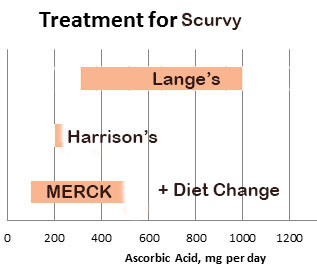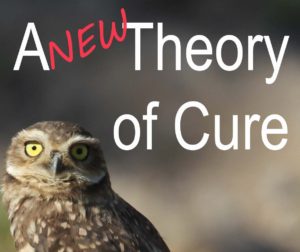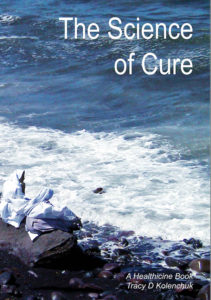We can’t cure scurvy. Why not? We know the cause of scurvy, in theory. Scurvy is defined as a deficiency of Vitamin C. Why is it that we can’t cure scurvy?
I know what you’re thinking. Your thinking “That’s crazy, we know the cause therefore, we know the cure“. But you’re wrong. Simply wrong. And the proof is trivial. Simpler than you think, and sillier than you might guess.
Let’s check Merck Manual of Diagnosis and Therapy (Merck), . The 19th edition was published in 2011 and it says “In developed countries, vitamin C deficiency can occur as part of general undernutrition, but severe deficiency (causing scurvy) is uncommon.” Scurvy is caused by a dietary deficiency of Vitamin C in the diet.
MERCK recommends: “Treatment: Nutritious diet with supplemental ascorbic acid. For scurvy in adults, ascorbic acid 100 to 500 mg po tid is given for 1 to 2 wk, until signs disappear, and followed by a diet supplementing 1 to 2 times the daily recommended intake. In scurvy, therapeutic doses of ascorbic acid restore the functions of Vitamin C within a few days. The symptoms and signs usually disappear over 1 to 2 weeks. Chronic gingivitis with subcutaneous hemorrhage persists longer.”
The word ‘cure’ does not appear anywhere in MERCK’s entry for vitamin C deficiency, does not appear with regards to scurvy. And Merck’s recommendation does not cure. Merck tells us how to treat scury, but not how to cure scurvy.
Well, that’s just silly. Or is it? Maybe we should check another reference. Surely we know how to cure scurvy?
Harrison’s Principles of Internal Medicine, another reference text, with thousands of pages, says: “Vitamin C deficiency causes scurvy.” That’s pretty clear. But does it say how to cure scurvy? “Administration of vitamin c (200 mg/d) improves the symptoms of scurvy within a matter of several days.”
Harrison’s does not use the word ‘cure’ either. And Harrison’s recommendation does not cure scurvy. We can, apparently, treat scurvy, but we cannot ‘cure’ it. Is it possible that both of these books made the same simple error? Maybe one copied the other?
How about Lange’s Current Medical Diagnosis and Treatment? Under the entry for Vitamin C, it says “Early manifestations of vitamin C deficiency are nonspecific and include malaise and weakness. In more advanced stages, the typical features of scurvy develop.” All three reference books agree that a severe dietary deficiency of vitamin C causes scurvy. But does Lange’s reference tell us how to cure scurvy? “Adult scurvy can be treated orally with 300-1000 mg of ascorbic acid per day. Improvement typically occurs within days.” Again, we are told how to ‘treat’ scurvy’. Lange’s does not use the word cure. And Lange’s recommendation does not cure scurvy.
I could go on… I often do. But let’s pause for a moment and to compare the three recommended ‘treatments’ (not cures).
Three prestigious medical reference books disagree on the dose, disagree on the follow-up, and none lists a ‘cure’. Can this be just a “simple error”? MERCK recommends a follow up dietary change, a supplement of 1 to 2 times the recommended daily intake of vitamin C. Harrison’s and Lange’s make no mention of dietary changes.
The three medical texts suggest three different treatments for scurvy. Which is correct? Do any of the treatments cure? No. If a patient has scurvy, for example, because they are working on a ship, or living in a prison, that provides an inadequate diet – and they develop scurvy, these treatments will address the signs and symptoms of scurvy. But as soon as the treatment is stopped, the scurvy will reappear. It was never cured.
Is scurvy an incurable disease?
No, it is not. But if you check any illness caused by a nutritional deficiency, in any of these three, and many other medical references, you won’t find the word ‘cure’. Why not? Perhaps it’s because only medicines can cure a disease. After all, it’s official, and it’s the law. According to the US/FDA regulations, “Nutrient deficiency disease claims describe a benefit related to a nutrient deficiency disease (like vitamin C and scurvy) … If a dietary supplement label includes such a claim, it must state in a “disclaimer” that FDA has not evaluated the claim. The disclaimer must also state that the dietary supplement product is not intended to “diagnose, treat, cure or prevent any disease,” because only a drug can legally make such a claim.”
According to the US FDA, no one can claim to cure scurvy. In fact, according to the US FDA, we cannot cure any disease caused by a nutritional deficiency, because only a drug can claim to cure. It’s nonsense, but it’s the law.
Cure, it seems, is defined by drugs. Only drugs can cure.
Of course there are lots of diseases that can be cured, but not by medicines. How do the FDA and the medical texts get around this problem? They don’t use the word ‘cure’. If you don’t use the word cure – except for drugs, except for medicines, then it’s easy to claim that only drugs can cure. QED. It’s a perfect bureaucratic solution.
I’ve used scurvy as a ‘model illness’, to illustrate the fact that there are many diseases, that we know how to cure, but officially cannot be cured. There are many more. Think heart disease, hypertension, diabetes, arthritis, depression, obesity, and more. Any disease that is not caused by a parasite – cannot be cured by a drug, and is thus ‘incurable’ according to current medical theory.
Curing Disease
But, we know how to cure scurvy, right? Actually, it’s not so simple. Suppose someone has scurvy. And we use the treatments recommend by MERCK, or Harrison’s, or Lange’s. Was it cured? How can we tell? Can we prove that a patient’s scurvy has been cured?
There is no test for ‘scurvy cured’. We can’t prove it was cured, because there is no medical test. We can demonstrate that the patient no longer exhibits symptoms of scurvy. We can prove that the patient can no longer be diagnosed as having scurvy. But that doesn’t prove the scurvy was cured. We can only prove that scurvy was not cured, by waiting to see if the signs and symptoms reappear.
There is no definition of cured for scurvy, nor for any other disease not caused by a parasite. We can’t prove that someone’s obesity was cured, or that their depression is cured, nor their hypertension – high blood pressure. Cure is not defined, therefore it cannot be proven. Therefore it cannot be accomplished.
If we cure someone’s scurvy with Lange’s treatment recommendation or Harrison’s treatment recommendation – it is almost certain to return. Did it ever go away? Maybe it was just in remission? What’s the medical difference between remission and cure? For most diseases, there’s no difference because cured is not defined, so remission cannot be defined independently. However, when scurvy is caused by a dietary deficiency, which has not been addressed, the disease has not been cured.
A symptomicine is a treatment that addresses symptoms, but not cause. Symptomicines often lead directly to chronic illness. In this case, to chronic scurvy. The treatments recommended by Lange’s and Harrison’s cannot cure. They can only lead to chronic illness, to chronic dependency on the ‘medicine’. The treatment removes the symptoms for a while. The patient returns to their normal, unhealthy eating pattern, and the symptoms re-appear. The scurvy was treated, but not cured. It returns as soon as the medicine is stopped. Symptomicines often cause chronic illness.
Cures:
An illness is cured when the cause has been successfully addressed.
Only MERCK’s recommendation: “followed by a diet supplementing 1 to 2 times the daily recommended intake.” can cure. If the diet is changed, the disease can be cured, forever. Merck’s treatment is the only one that addresses the cause. The MERCK recommendation can cure scurvy. But, perhaps because there is no test for scurvy cured, MERCK does not use the word cure.
We might ask, in this day and age, why two of three medical references do not recommend the cure, why they give recommendations that cannot cure, and why none of the three uses the word cure? Frankly, I cannot answer that question.
Defining Cured:
Can we cure scurvy? If we want to cure scurvy, or any other disease “not caused by a parasite“, we need a definition of cured. The current medical bureaucracies do not have one. How can we tell if the illness is cured? Are there any models, any incurable diseases, where we cannot prove the disease was cured – but we use the word cured? Yes. As far as I know, only one.
Cancer. We cannot prove that cancer has been cured. So we adopt a simple protocol. If the patient is diagnosed with cancer, and they survive, and 5 years later they are still alive, and still cannot be diagnosed with cancer, we count them as ‘cured’. It’s a silly rule. Arbitrary, but somewhat useful. However, it misses an important distinction about cured.
An illness has been cured when the cause has been addressed. Scurvy caused by an unhealthy diet is cured when the diet is healthed, not when the symptoms disappear.
There is a complication. Scurvy might be a specific incident or a chronic condition.
Sometimes scurvy is the result of a specific incident. A person goes to work on a ship that provides an unhealthy diet and develops scurvy. The illness is permanently cured when they quit their job, and permanently change their diet. There is no risk of remission.
But if the person persists in working on a ship that provides an unhealthy diet, and then spending time on shore, and back on the ship, the scurvy that develops is a chronic disease. When they are on shore, their scurvy is in remission, because the cause is in remission. When they go back on the ship, it re-emerges. This is a chronic illness – chronic scurvy. It can only be cured by addressing the chronic problem – by never going back on board that ship. If the patient stops working for the ship, changes their diet, and their scurvy is cured. In this case, if they decide to take up that job again, they will develop a NEW case of scurvy. New, because the original case was cured by addressing the cause.
But the causes of scurvy are many. There are three basic types of illness, as defined by cause: process causes, attribute causes, and injury causes. Scurvy might be caused by any one of the three types. Each of the three types of causes might have a cause in body, mind, spirit, or community. Scurvy might be caused by a process or lack of process – what the patient regularly eats might exclude Vitamin C. Scurvy might be caused by an attribute, a thing – perhaps the patient is too poor to by healthy foods, or an addict who spends all their money on drugs or alcohol. Scurvy might be caused by an injury to the patient’s cook, which results in dietary issues leading to scurvy. Each type of cause might be chronic, in which case the illness is chronic. In each case, the cure is not a medicine, the cure is to health the patient. Health is a verb. Scurvy is cured by a process, not by a substance.
If we want to cure any illness, including scurvy, we need to study cures, and causes, not signs and symptoms. Addressing signs and symptoms often appears to work when an illness is cured by health – but otherwise, it cannot cure.
Perhaps the problem for the medical reference texts is the fact that there are too many cures for scurvy, and none fits well into a medical reference text. Causes are many and varied – and every cause has a cause – adding to the complexity. However, the fact that every cause has a cause often presents more, not fewer opportunities to cure. Scurvy caused by working on a ship with an unhealthy diet is cured by getting a job on land, or on a better ship. Scurvy caused by a dislike for specific foods might be cured by education and the introduction of other foods containing Vitamin C. Scurvy caused by poverty or alcoholism can only be cured by addressing the poverty or alcoholism. There are potentially hundreds of cures for scurvy because CURE is a verb, not something you buy at a pharmacy.
Every illness can be cured – The Healthicine Creed. The cure is the cause.
to your health, tracy



